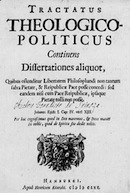
Source: Theologico-Political Treatise - Chapter III - Of the Vocation of the Hebrews, and Whether the Gift of Prophecy was Peculiar to Them
Spinoza's Chapter 3. - knowledge and control of the emotions will help establish the good life (Page 3)
 I return to my purpose of discovering the reason why the Hebrews were said to be elected by God before other nations.
I return to my purpose of discovering the reason why the Hebrews were said to be elected by God before other nations.
All objects of legitimate desire fall, generally speaking, under one of these three categories:
1. The knowledge of things through their primary causes.
2. The government of the passions, or the acquirement of the habit of virtue.
3. Secure and healthy life.
Spinoza here states some of the ideas he expanded in his Ethics. Things that men desire can be categorized under the headings of knowledge, control over their emotions or a good life. The first two are achievable through individual effort and are not the province of any one group or nation of men. Knowledge of things and emotional control can be shared or obtained by the whole human race. A secure and healthy life, however, is dependent on external circumstances and though fools may be as happy as wise men, nevertheless, human management and watchfulness can greatly assist towards living in security and warding off the injuries of our fellow-men.
In this section he goes on to say that reason and experience show that a society with fixed law and which is directed by far-seeing and careful men is most stable. The Hebrew nation was not especially wise or peaceful but prospered, when it did, because of good organization and in all other respects was just like other nations. They were not in any way a "chosen" people.
For Spinoza the goals of any social organization are security and comfort of it citizens which can only be obtained if they all obey its laws. If they don't, they destroy the state. He adds that the laws of the Old Testament were for the Jews alone. If they apply to other nations he cannot say.